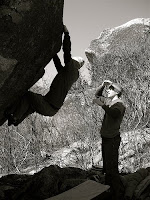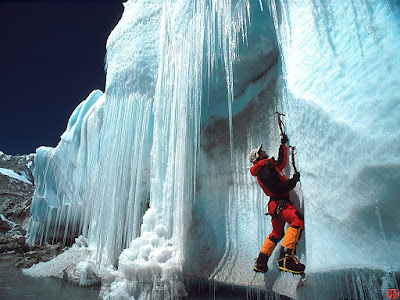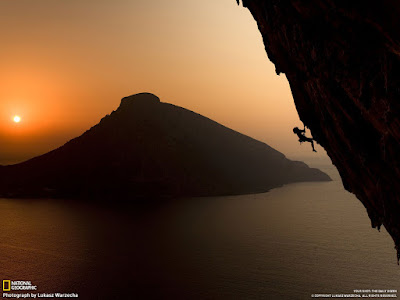Mountaining. Up North, the Himalayan ranges are the most intimidating, enthralling and beautiful mountains in the world. For any mountaineer, the Himalayas are a perennial challenge.
The mountaineering season is normally between April and November but the winter seasons, though colder have clearer days.
 There is something new to see in every season and every region: the gentle slopes of the Garhwal and Kumaon region, the sharp ragged gorges of Kulu and Lahaul in Himachal Pradesh, the pristine untouched beauty of Sikkim, the almost unexplored Arunachal Pradesh, the fantastic moonscapes of the Zanskar range in Jammu and Kashmir.
There is something new to see in every season and every region: the gentle slopes of the Garhwal and Kumaon region, the sharp ragged gorges of Kulu and Lahaul in Himachal Pradesh, the pristine untouched beauty of Sikkim, the almost unexplored Arunachal Pradesh, the fantastic moonscapes of the Zanskar range in Jammu and Kashmir.
The high altitude peaks of Nun-Kun Massif in Ladakh, Nanda Devi in Garhwal, and Dunagiri in Kumaon offer challenging peaks for mountaineering. In Kumaon, the popular areas are the Kalabaland glacier system, the Panch Chulhi, the Rajrambha, and Chaudhara peaks, and the peaks of the Nandakot basin.
Levels of Difficulty
Most mountaineering routes are graded, according to levels of difficulty and accessibility. A moderate degree would require very basic mountaineering techniques. These can be learnt at the Nehru Institute of Mountaineering at Uttarkashi and the Western Himalayan Institute of Mountaineering at Manali.
An advanced degree of mountaineering would require the mountaineer to be in absolute fit physical condition. Skills can be learnt either by actual experience or doing advanced courses at recognised institutes.

HISTORY OF MOUNTAINEERING
Mountain Climbing started for the first time in 1786 with the climb of two French,one is a doctor, to Mont Blanc (4807 mt), the highest summit of the Europe.After the first half of the 19th century in which there were some discovery and military purposed climbings, between 1850 and 1860 all the summits in Switzerland had been climbed by the climbers one after another.The period which was called the golden period of the European Mountaineering came to an end with the climb to the most difficult summit of the Alps,Matterhorn in 1865.After that, until the end of the century, all the summits of the Middle Europe had been climbed without failure.It was climbed to the highest summit of the Ands,Aconcagua (6960 mt) in 1897,Grand Teton (4190 mt) North America in 1898, St. Elias (5489 mt)Alaska in 1897 and the highest summit of North America,Mc Kinley (6194 mt) in 1913. In the first half of the 20th century, there were many climbs done by various mountaineers in addition to French,English and Swiss.
The most important climb was done to the Communism Summit (7495 mt),Pamir Mountain Chain. After the obvious calmness caused by the Second World War, French mountaineers climbed the most important summit of the Himalayas, Annapurnal (8138mt) in 1950. Right after that, all the other 8000 metres summits were climbed by the mountaineers one by one: Nanga Parbat (8138 mt) by Germans in 1953, K2 (8681 mt) by Italians in 1954,Lhotse (8516 mt) by Swiss in 1955, Makalu (8463 mt) by French.Among all those climbs ,the most sensational climb was the one done by Edmund Hillary and Tenzig Norgay to the most highest summit of the world, Everest (8848 mt) in 29 May 1953.The most difficult routes of the summits climbed in 1960s in Europe and America were attempted in the hard winter conditions. The most sensational one of those climbs was done to the 914 metres Sierra, Nevada Mountains by following the El Captain route in 1970 by Americans within 27 days.

The most important person of the high elevation mountaneering Reinhold Messner climbed Everest by going beyond 8000 metres defined as the deadline without using supplement oxygen with Peter Habbler in 1978.1980s was the period in which mountaineering was highly popularized.Millions of people in Europe and America started to wander along the mountains.Technological development in the mountaineering equipments and easiness of reaching to the mountains were the reasons for that widespread profession.From now on,it is possible to see queues on the path to the Mont Blanc's climbing route.It can be climbed to Himalayas only by reservations.It is possible to wander along the hills of 8000 metres and high elevation walks with the programs of the tourism organizations.Everest which is full until the year 2000,shows hospitality to the hundreds of climbers ,live broadcasts and many more people and as a result of all those activities it faces with an unbelievable pollution. Getting more and more crowded everyday not only brings this high pollution but also many accidents.
HIPOTERMI AND LOCAL FREEZING
Two most common sicknesses caused by cold are hipotermi and local freezing. Hipotermi is the decreasing of the body's interior temperature abnormally; local freezing is the freezing of some cells in the body's certain parts.To be able to prevent and to cease these sicknesses, firstly it must be known that how heat is produced and lost and reactions of the human body's to the cold.
The mountaineering season is normally between April and November but the winter seasons, though colder have clearer days.
 There is something new to see in every season and every region: the gentle slopes of the Garhwal and Kumaon region, the sharp ragged gorges of Kulu and Lahaul in Himachal Pradesh, the pristine untouched beauty of Sikkim, the almost unexplored Arunachal Pradesh, the fantastic moonscapes of the Zanskar range in Jammu and Kashmir.
There is something new to see in every season and every region: the gentle slopes of the Garhwal and Kumaon region, the sharp ragged gorges of Kulu and Lahaul in Himachal Pradesh, the pristine untouched beauty of Sikkim, the almost unexplored Arunachal Pradesh, the fantastic moonscapes of the Zanskar range in Jammu and Kashmir.The high altitude peaks of Nun-Kun Massif in Ladakh, Nanda Devi in Garhwal, and Dunagiri in Kumaon offer challenging peaks for mountaineering. In Kumaon, the popular areas are the Kalabaland glacier system, the Panch Chulhi, the Rajrambha, and Chaudhara peaks, and the peaks of the Nandakot basin.
Levels of Difficulty
Most mountaineering routes are graded, according to levels of difficulty and accessibility. A moderate degree would require very basic mountaineering techniques. These can be learnt at the Nehru Institute of Mountaineering at Uttarkashi and the Western Himalayan Institute of Mountaineering at Manali.
An advanced degree of mountaineering would require the mountaineer to be in absolute fit physical condition. Skills can be learnt either by actual experience or doing advanced courses at recognised institutes.

HISTORY OF MOUNTAINEERING
Mountain Climbing started for the first time in 1786 with the climb of two French,one is a doctor, to Mont Blanc (4807 mt), the highest summit of the Europe.After the first half of the 19th century in which there were some discovery and military purposed climbings, between 1850 and 1860 all the summits in Switzerland had been climbed by the climbers one after another.The period which was called the golden period of the European Mountaineering came to an end with the climb to the most difficult summit of the Alps,Matterhorn in 1865.After that, until the end of the century, all the summits of the Middle Europe had been climbed without failure.It was climbed to the highest summit of the Ands,Aconcagua (6960 mt) in 1897,Grand Teton (4190 mt) North America in 1898, St. Elias (5489 mt)Alaska in 1897 and the highest summit of North America,Mc Kinley (6194 mt) in 1913. In the first half of the 20th century, there were many climbs done by various mountaineers in addition to French,English and Swiss.
The most important climb was done to the Communism Summit (7495 mt),Pamir Mountain Chain. After the obvious calmness caused by the Second World War, French mountaineers climbed the most important summit of the Himalayas, Annapurnal (8138mt) in 1950. Right after that, all the other 8000 metres summits were climbed by the mountaineers one by one: Nanga Parbat (8138 mt) by Germans in 1953, K2 (8681 mt) by Italians in 1954,Lhotse (8516 mt) by Swiss in 1955, Makalu (8463 mt) by French.Among all those climbs ,the most sensational climb was the one done by Edmund Hillary and Tenzig Norgay to the most highest summit of the world, Everest (8848 mt) in 29 May 1953.The most difficult routes of the summits climbed in 1960s in Europe and America were attempted in the hard winter conditions. The most sensational one of those climbs was done to the 914 metres Sierra, Nevada Mountains by following the El Captain route in 1970 by Americans within 27 days.

The most important person of the high elevation mountaneering Reinhold Messner climbed Everest by going beyond 8000 metres defined as the deadline without using supplement oxygen with Peter Habbler in 1978.1980s was the period in which mountaineering was highly popularized.Millions of people in Europe and America started to wander along the mountains.Technological development in the mountaineering equipments and easiness of reaching to the mountains were the reasons for that widespread profession.From now on,it is possible to see queues on the path to the Mont Blanc's climbing route.It can be climbed to Himalayas only by reservations.It is possible to wander along the hills of 8000 metres and high elevation walks with the programs of the tourism organizations.Everest which is full until the year 2000,shows hospitality to the hundreds of climbers ,live broadcasts and many more people and as a result of all those activities it faces with an unbelievable pollution. Getting more and more crowded everyday not only brings this high pollution but also many accidents.
HIPOTERMI AND LOCAL FREEZING
Two most common sicknesses caused by cold are hipotermi and local freezing. Hipotermi is the decreasing of the body's interior temperature abnormally; local freezing is the freezing of some cells in the body's certain parts.To be able to prevent and to cease these sicknesses, firstly it must be known that how heat is produced and lost and reactions of the human body's to the cold.
Related Post:
Mp3 Download




15 komentar:
smile from Indonesia :) keep blogging and smiling :)
I can only see this mountain on TV or magazine. It always reminds me to stay humble. Because I'm just a dust compare to this incredible mountain.. Great pictures you have there..
nice info,this beutyfull world.succes for you.
there is no mountain climbers that not dreaming about to climb himal and others seven summit. as a local mountain climber to climb the top of jaya is still a part of my dreams, theres to much things to prepare indeed, an expedition management must be the seriously thinkin about. It take cost too high for me as an amateur climber.
montana para libery ma bro :peace:
kunjungan malam blognya keren abissssss
mampir malem sob sambil liat indahnya pegunungan... nice post! :D
berkunjung malam
hellooo... nice posting.. :D
mntafff,...
Thanks for visiting my blogs
nice blogs
thx a lot...
nice blog,enak untuk dibaca2 blognya...
:)
morning
blog walking
Hai Blog walking hehe :-)
visiting my blog :)
Post a Comment